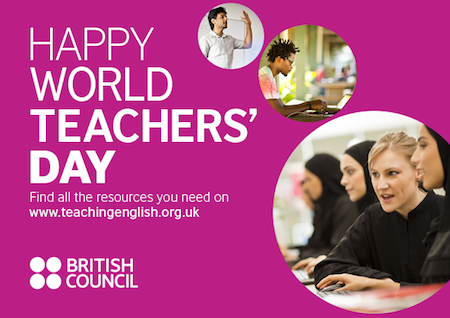
Motivation
Motivation is a big issue, particularly with teenage learners. Below are links to an article, a blog post, a publication, a video tip and a webinar recording, which all look at ways to motivate our students.
- I’m a terrible student - motivate me A blog post by Sandy Millin which looks at two online tools and some of the ways they can be used to encourage students to do homework and study outside the classroom.
- Motivating teenagers An article by Jo Budden looking at how using journals, using music and using photos can help teachers to motivate their teenage learners.
- Innovations in the continuing professional development of English language teachers This publication from the British Council’s ‘Innovations’ series, edited by David Hayes presents 13 papers looking at a variety of continuing professional development (CPD) initiatives around the world. There is a strong thread throughout which highlights the positive impact of CPD on teachers’ levels of motivation.
- Using games to engage, motivate and educate language learners This webinar recording by David Dodgson looks at how online games can be effective at motiving learners of all ages. David provides us with several practical examples.
- Energising classes From 1-minute discussions about shopping to suggestions for dealing with the classes you dread the most, this video tip looks at a number of strategies for energising and motivating your learners.
Mixed ability classes
Teaching classes with a mixed ability of levels is a challenge. Below are links to an article, a radio programme and a blog post which all look at strategies for dealing with multi-level classes.
- Adapting materials for mixed ability classes This article by Jo Budden gives several practical suggestions on adapting materials for mixed-ability classes and lots of classroom management tips to help you teach multi level groups.
- Large multi-level classes: worlds within worlds This blog post by Chrysa Papalazarou provides an insightful look at the world of teaching large classes in a state school in Greece. Chrysa takes us through her thought-processes and strategies for coping in difficult contexts.
Communicative Language Teaching
Communicative methods of teaching are designed to give students opportunities to practise their English, but how communicative are our classes and how can we ensure our students are getting enough practice? The article, publication and seminar recording below all look at creative ways to ensure a communicative focus happens.
- Making writing communicative In this article, Paul Kaye explores some of the reasons why writing sometimes lacks a communicative focus in the language classroom and offers a number of ideas for making writing tasks more communicative.
- Creativity in the English language classroom Edited by Nik Peachey and Alan Maley, this publication contains several practical activities which explore the role of creativity in the classroom, both in the sense of helping students to express their unique creative identity and also by helping them think about and use language in a creative way.
- Teaching grammar inductively This British Council seminar by Catherine Walter looks at the teaching of grammar using an inductive approach. You can watch episodes of the seminar and work through interactive tasks.
Exams
Exams are an integrated part of much of our students' lives. It can sometimes be a challenge to help them pass the exams whilst retaining a focus on learning and communication. The two articles and webinar recording below offer some ideas.
- Teenagers and exams This article by Samantha Lewis explores the process of preparing for an exam and provides a number of excellent tips and strategies that teachers can use.
- Teaching exam-based writing skills This article by Jennifer Bedwell looks at how we can teach writing skills for exam preparation more effectively. Jenny looks at a number of motivating techniques that teachers can use in the classroom.
- The IELTS speaking test This webinar recording by Kishore Roy takes an in-depth look at the IELTS speaking test and offers some practical tips to teachers helping their students prepare for the IELTS exam.
Giving effective feedback
Feedback with students is an important part of teaching but giving effective feedback is not always easy. The articles below offer practical ideas and suggestions for you to try out in your classroom.
- Conducting feedback on exercises and tasks This article by Steve Darn and Nick Baguley looks at why feedback is important, how we pre-empt lengthy feedback and a range of suggestions for student-led feedback.
- Peer editing and correction Watch this video tip looking at peer editing and correction, which incorporates using the overhead projector transparencies.
- Getting student feedback Two simple activities to use with primary students and teenagers to help them get used to thinking for themselves about their learning and what happens in the class.
Why did you become a teacher?
Was it something you had always planned to do or did you fall into teaching by accident. Read the posts below to find out how and why some of our bloggers became teachers.
- Shanthi Cumaraswamy Streat: My journey so far
- Vicky Saumell: My journey as a teacher: a winding road
- Maria Theologidou: My teaching journey
- David McFetridge: Learning to be a teacher in Spain, the UK and Germany
- Larry Ferlazzo: Why I became a teacher
- Sandy Millin: Highlights from my teaching story
- JVL Narasimha Rao: Why I became a teacher
Whatever your path towards becoming a teacher, we wish you a very happy World Teachers' Day